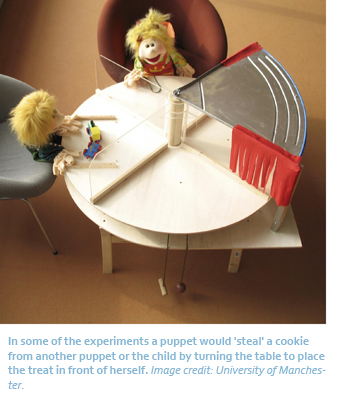
Research with Thieving Puppets Demonstrates Toddlers' Caring Sides
June 18, 2015—An experiment conducted by the University of Manchester has shown that three and five-year-old children will intervene to protect others from theft and distress, even when not personally affected.
The researchers, working with colleagues from the Max Planck Institute and University of St. Andrews, set up experiments with rotating tables, puppets and cookies and toys to see whether children had a sense of restorative justice on behalf of others, something previously only observed among older children.
In some of the experiments a puppet would 'steal' a cookie from another puppet or the child by turning the table to place the treat in front of herself. The child had the ability to turn the table back or put the cookie in a section where it was inaccessible, which, in the case of theft, served as a punishment.
In a demonstration of concern for others, the children largely returned the cookie to the victim, whether it was themselves or the wronged puppet. If they could return the cookie to its owner rather than put it somewhere inaccessible to the thief, they preferred to do this as well.
Dr. Keith Jensen, an author of the study from The University of Manchester's School of Psychological Sciences,noted that, "Humans seem to be the only species to show a concern for the welfare of others. Even our closest relatives—chimpanzees—will not punish third party violations. We've not seen this behaviour in children this young before and it does seem to indicate that pre-school children act out of concern for the welfare of a victim."
The children were unlikely to steal the cookies themselves—this was only recorded a few times and they preferred to return them to the victim when they could.
The surprising finding from the research is that children were just as concerned for what happened to a puppet as they were when personally affected. Their sense of justice appeared to be focussed more of the victim than as a deterrent for the thief.
Dr Jensen added: "At the preschool age, children have a sense of justice based on sensitivity to harm. They might be sensitive to third-party violations and will punish these, but younger children, at least, are less concerned about the perpetrator. From this early, prosocial sense of justice, third-party punishment—which is the enforcer that stabilises cooperation - emerges."
The paper, 'Restorative justice in children', appears in the journal, Current Biology.
JAMIE BROWN
ARTICLE:
“Restorative Justice in Children,” Katrin Riedl, Keith Jensen, Josep Call, Michael Tomasello. Current Biology: In Press Corrected Proof, June 18, 2015. DOI: http://dx.doi.org/10.1016/j.cub.2015.05.014
